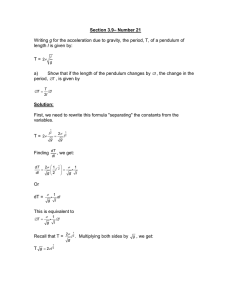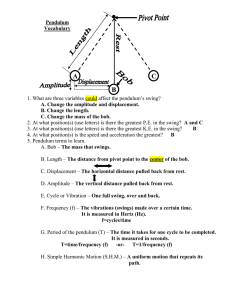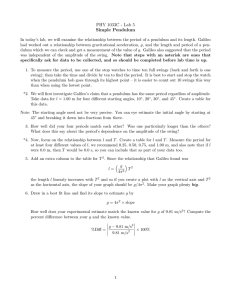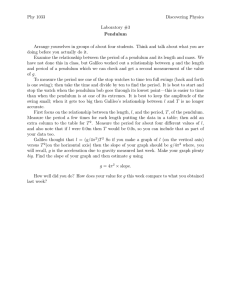front view side view - Glenbard West High School
advertisement
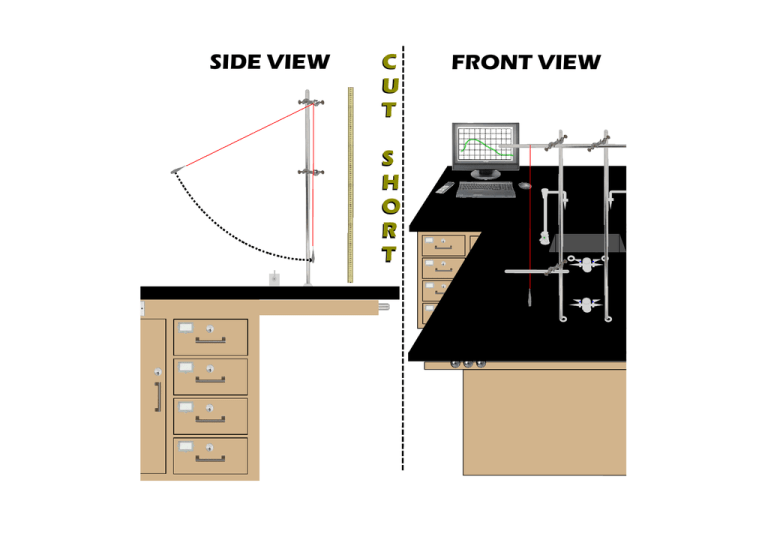
SIDE VIEW
C
U
T
S
H
O
R
T
FRONT VIEW
SIDE VIEW
Start Height
Pick and then measure this
C
U
T
S
H
O
R
T
FRONT VIEW
The center of mass of the pendulum bob is about here. This is where you want to reference all of your measurements using the pendulum.
3
Possible Predictions: WITHOUT CROSS BAR
Start Height
Swings to same height as start height.
Start Height
Start Height
Swings higher than start height
Swings lower than start height.
WITH CROSS BAR
Start Height
Possible Predictions:
Swings to same height as start height.
Start Height
Start Height
Swings higher than start height
Swings lower than start height.
Start Height
Move the center rod to a height above the start height and predict how high the pendulum will swing compared to the cross bar:
• Higher?
• Lower?
• Same height?
Start Height
Move the center rod to a height below the start height and predict how high the pendulum will swing compared to the cross bar:
• Higher?
• Lower?
• Same height?
With a taut string, how high is the loop height in comparison to the drop height?
Start Height
Loop
Height
FRONT VIEW
C
O
N
S
E
R
V
I
N
G
Y
O
U
R
E
N
E
R
G
Y
SIDE VIEW
L
C
O
N
S
E
R
V
I
N
G
Y
O
U
R
SIDE VIEW
E
N
E
R
G
Y
Start Height
FRONT VIEW
{
{ h.a.t.
height above table
{
{
2.8 cm =
diameter of the mass diameter of the mass
{
2.8 cm =
diameter of the mass diameter of the mass
The "X" shows the center of mass. This is where you want to measure the bottom of 'h' to determine P.E.
P.E. = mgh
{
2.8 cm =
diameter of the mass Measure from Measure from here to the table here to the table to get h.a.t.
BY THE WAY...
200
g
The "ThawSpace"
is where we store files for use in
Physics!!!
Can you
guess
what the
file you
need for
this lab is
called?
Can you
guess
what the
file you
need for
this lab is
called?
Pendulum Lab!!!
Double click to open the file
No really, click it!!!
Time (s)
0.955837
0.969516
1.969516
1.917134
2.817128
2.831016
Gate State
0
1
0
1
0
IGNORE THESE EXTRA VALUES!
1
Subtract these 2 numbers to find the time the mass passed by the photo gate. Use the diameter and this time to calculate velocity = d/t
Yes, you will be getting answers in the 0.01­0.08s range.
Time (s)
0.955837
0.969516
1.969516
1.917134
2.817128
2.831016
Gate State
0
1
0
1
0
1
0.969516
0.955837
0.013679
WARNING:
DO NOT ROUND THE SUBTRACTED TIME. ONLY ROUND TO PROPER SIGNIFICANT FIGURES AFTER CALCULATING THE PENDULUM VELOCITY.
P.E.top = K.E.bottom
mgh = ½mv2
Is energy conserved?
Calculate the % Difference:
|P.E. ­ K.E.|
(Avg of P.E. & KE)
X 100 = % Difference
NOTE:
If you find that your
Start Height
P.E.top > K.E.bottom
{
...you probably forgot to subtract out the h.a.t.!!!
height above table
{
Read the Lab!!!
Attachments
Pendulum Lab.cmbl
